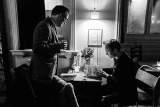Alex Williams q&a
Alex Steuart Williams interview
Photojournalist Richard Keith Wolff catches up with the busy Times cartoonist Alex Steuart Williams at his studio before the 20 years Celebrations of his cartoon strip "The Queen's Counsel" to ask him about his enduing cartoon strip at the London Times Newspaper.
Richard Keith Wolff: How did you get started and find a newspaper to publish your cartoon strip, "The Queen's Counsel" was that hard?
Alex Steuart Williams: It wasn’t exactly easy to get published, but it was much less hard than it would be now, given the decline of the newspaper industry. I sent in Queen’s Counsel to The Times, The Spectator and Private Eye. It was a cold call, really. But what we had on our side was the fashion for lawyer jokes in the early 90s. Back then lawyers were enemy number one – much as bankers are today. Except there were more jokes. And, as it turned out, both The Times and The Spectator said yes.
RKW: How did you come up with the concept of the series and the designs of the characters?
ASW: The characters were all composites of people I knew. They are archetypes really. And the drawing style was simply my own personal style, which was a bit scratchy at first (as Ian Hislop put it) but which gradually improved over time.
RKW: What motivated you, is the cartoon a place to bring attention to important issues in an entertaining way, or is it leaning more towards pure entertainment?
ASW: The strip began as fairly cruel satire, but after a while I started to pull my punches a bit, and the jokes softened. Lawyers aren’t evil. What they do for a living is a mirror of the disputes and tensions in society. The legal system is an arena for a non-violent form of warfare; it is inherently confrontational. So it’s not surprising that people hate lawyers, but really we should ask ourselves why we can’t resolve our own differences. I still make fun of them though – that’s the whole point.
RKW: How do the worthy people in the world of law take to being mocked?
ASW: I rarely mock specific individuals. Partly that is because of libel laws, which exert far more censorship than newspaper editors ever do. But mostly it’s because I don’t particularly want to point the finger at any one person. Occasionally I will poke gentle fun at a particular individual – and with any luck they end up buying the original drawing.
RKW: As a trained Barrister you have a foot in the legal camp and as a cartoonist the arts, this seems a big stretch would you not say!
ASW: Yes, and in the end I couldn’t do both. I had to choose, and I picked the arts. I haven’t practiced law since 1996, when I left the Bar to go and work for Warner Bros in LA.
RKW: This is film animation which is yet another field, though a related one, how did that come about and is that as rewarding?
ASW: My father (Richard Williams) is an animator so I grew up with the animation business; it’s in our family DNA. I was always being pulled towards it. And then, in the mid 1990s, following the huge success of Aladdin and The Lion King, Hollywood started to offer fat salaries and bonuses to animators. The phone started to ring and didn’t stop. So I am afraid I got seduced back into the industry. But it’s a fun industry – I have no regrets.
RKW: Do you think your Times Cartoon could be adapted to being an animated TV series or film.
ASW: Definitely! The film rights are still available! A couple of million should do the trick, plus my own trailer and personal masseuse of course.
RKW: When people ask you what you do, which career do you run with?
ASW: I do animation and cartoons. I also teach a bit, too. Last year I set up an online school, Animation Apprentice, which teaches animation online to students all over the world. I’m a huge believer in online training; it’s a better mousetrap, so much more effective than a traditional classroom.
RKW: The Times Cartoon strip, by its nature must eat up tons of ideas each week, how do you keep coming up with new ideas, do you have a gigantic team of writers sweating it out each week or do you stick to one, or do you write the stories your self?
ASW: I write it myself. But, since I don’t have my own personal experience of practicing law to draw on anymore, it does get harder. Various people have contributed ideas to the strip over the years. And my wife is a solicitor for a big city firm. Her daily grind is grist for the cartoon mill. So, really, she writes all my jokes. Or, as she puts it, she “writes the funny ones”.
RKW: What is the cartoonist you are most inspired by?
ASW: I love Posy Simmonds’ work in The Guardian. Charles Peatty and Russell Taylor, who draw the cartoon strip Alex in the daily Telegraph, were a big inspiration to me in the early years. And I love Calvin & Hobbes, Asterix, and Tintin.
RKW: What is the lawyer that you most admire?
ASW: That’s a hard one. There are plenty of lawyers who are admirably good at what they do, but that isn’t quite the same as being admirable. And most of the lawyers who get admired, usually do it for something other than law. Good judges can be admirable. Maybe Lord Denning – he was a great judge.
RKW: Yes Lord Denning had a clear and fair mind. The law is always being challenged not least by criminals. But it is also challenged legitimately responding to issues of the times. However the rule of law with all its checks and balances with concept of justice and fair play at its heart has been challenged by methods of circumvention in recent times by the most unlikely perpetrator. What are your thoughts about, kidnapping re-named 'extraordinary rendition', torture 're-branded 'enhanced interrogation', imprisonment with out charge, trial or end date 'detention' ? Is changing the name of a crime sufficient to render it legal!
ASW: These are all features of the growing power of the state over the individual and the gradual restriction of our civil liberties. I probably have about as much influence over this process as the next cartoonist - which is to say none at all. But I do like to make fun of it. Maybe laughter is a better weapon than protest. Or maybe both are equally ineffective; ask me again in ten years.
RKW: I get back to you then! What’s it like working for Rupert Murdoch?
ASW: I have worked for The Times for two decades but have never even come close to meeting its proprietor. In fact, I have only been in to visit the newspaper on three occasions in twenty years. But print is in steep decline and I think we will be sorry when the newspapers are gone. The truth is I am grateful for having had a job that I love for the past 20 years.
Alex Steuart Williams, attending the 20 years of cartoons from THE TIMES 1993 - 2013 "The Queen's Counsel LAWYER'S OMNIBUS" at the Bush Theatre, Shepherds Bush, London, UK, 22nd November 2013
PS: 2017 Alex Williams is awarded ‘The Cartoon Art Trust Award for Strip Cartooning’ for his cartoon strip “Queen's Counsel” published in the Times since 1993, at the annual CAT Awards.
Photojournalist Richard Keith Wolff catches up with the busy Times cartoonist Alex Steuart Williams at his studio before the 20 years Celebrations of his cartoon strip "The Queen's Counsel" to ask him about his enduing cartoon strip at the London Times Newspaper.
Richard Keith Wolff: How did you get started and find a newspaper to publish your cartoon strip, "The Queen's Counsel" was that hard?
Alex Steuart Williams: It wasn’t exactly easy to get published, but it was much less hard than it would be now, given the decline of the newspaper industry. I sent in Queen’s Counsel to The Times, The Spectator and Private Eye. It was a cold call, really. But what we had on our side was the fashion for lawyer jokes in the early 90s. Back then lawyers were enemy number one – much as bankers are today. Except there were more jokes. And, as it turned out, both The Times and The Spectator said yes.
RKW: How did you come up with the concept of the series and the designs of the characters?
ASW: The characters were all composites of people I knew. They are archetypes really. And the drawing style was simply my own personal style, which was a bit scratchy at first (as Ian Hislop put it) but which gradually improved over time.
RKW: What motivated you, is the cartoon a place to bring attention to important issues in an entertaining way, or is it leaning more towards pure entertainment?
ASW: The strip began as fairly cruel satire, but after a while I started to pull my punches a bit, and the jokes softened. Lawyers aren’t evil. What they do for a living is a mirror of the disputes and tensions in society. The legal system is an arena for a non-violent form of warfare; it is inherently confrontational. So it’s not surprising that people hate lawyers, but really we should ask ourselves why we can’t resolve our own differences. I still make fun of them though – that’s the whole point.
RKW: How do the worthy people in the world of law take to being mocked?
ASW: I rarely mock specific individuals. Partly that is because of libel laws, which exert far more censorship than newspaper editors ever do. But mostly it’s because I don’t particularly want to point the finger at any one person. Occasionally I will poke gentle fun at a particular individual – and with any luck they end up buying the original drawing.
RKW: As a trained Barrister you have a foot in the legal camp and as a cartoonist the arts, this seems a big stretch would you not say!
ASW: Yes, and in the end I couldn’t do both. I had to choose, and I picked the arts. I haven’t practiced law since 1996, when I left the Bar to go and work for Warner Bros in LA.
RKW: This is film animation which is yet another field, though a related one, how did that come about and is that as rewarding?
ASW: My father (Richard Williams) is an animator so I grew up with the animation business; it’s in our family DNA. I was always being pulled towards it. And then, in the mid 1990s, following the huge success of Aladdin and The Lion King, Hollywood started to offer fat salaries and bonuses to animators. The phone started to ring and didn’t stop. So I am afraid I got seduced back into the industry. But it’s a fun industry – I have no regrets.
RKW: Do you think your Times Cartoon could be adapted to being an animated TV series or film.
ASW: Definitely! The film rights are still available! A couple of million should do the trick, plus my own trailer and personal masseuse of course.
RKW: When people ask you what you do, which career do you run with?
ASW: I do animation and cartoons. I also teach a bit, too. Last year I set up an online school, Animation Apprentice, which teaches animation online to students all over the world. I’m a huge believer in online training; it’s a better mousetrap, so much more effective than a traditional classroom.
RKW: The Times Cartoon strip, by its nature must eat up tons of ideas each week, how do you keep coming up with new ideas, do you have a gigantic team of writers sweating it out each week or do you stick to one, or do you write the stories your self?
ASW: I write it myself. But, since I don’t have my own personal experience of practicing law to draw on anymore, it does get harder. Various people have contributed ideas to the strip over the years. And my wife is a solicitor for a big city firm. Her daily grind is grist for the cartoon mill. So, really, she writes all my jokes. Or, as she puts it, she “writes the funny ones”.
RKW: What is the cartoonist you are most inspired by?
ASW: I love Posy Simmonds’ work in The Guardian. Charles Peatty and Russell Taylor, who draw the cartoon strip Alex in the daily Telegraph, were a big inspiration to me in the early years. And I love Calvin & Hobbes, Asterix, and Tintin.
RKW: What is the lawyer that you most admire?
ASW: That’s a hard one. There are plenty of lawyers who are admirably good at what they do, but that isn’t quite the same as being admirable. And most of the lawyers who get admired, usually do it for something other than law. Good judges can be admirable. Maybe Lord Denning – he was a great judge.
RKW: Yes Lord Denning had a clear and fair mind. The law is always being challenged not least by criminals. But it is also challenged legitimately responding to issues of the times. However the rule of law with all its checks and balances with concept of justice and fair play at its heart has been challenged by methods of circumvention in recent times by the most unlikely perpetrator. What are your thoughts about, kidnapping re-named 'extraordinary rendition', torture 're-branded 'enhanced interrogation', imprisonment with out charge, trial or end date 'detention' ? Is changing the name of a crime sufficient to render it legal!
ASW: These are all features of the growing power of the state over the individual and the gradual restriction of our civil liberties. I probably have about as much influence over this process as the next cartoonist - which is to say none at all. But I do like to make fun of it. Maybe laughter is a better weapon than protest. Or maybe both are equally ineffective; ask me again in ten years.
RKW: I get back to you then! What’s it like working for Rupert Murdoch?
ASW: I have worked for The Times for two decades but have never even come close to meeting its proprietor. In fact, I have only been in to visit the newspaper on three occasions in twenty years. But print is in steep decline and I think we will be sorry when the newspapers are gone. The truth is I am grateful for having had a job that I love for the past 20 years.
Alex Steuart Williams, attending the 20 years of cartoons from THE TIMES 1993 - 2013 "The Queen's Counsel LAWYER'S OMNIBUS" at the Bush Theatre, Shepherds Bush, London, UK, 22nd November 2013
PS: 2017 Alex Williams is awarded ‘The Cartoon Art Trust Award for Strip Cartooning’ for his cartoon strip “Queen's Counsel” published in the Times since 1993, at the annual CAT Awards.






